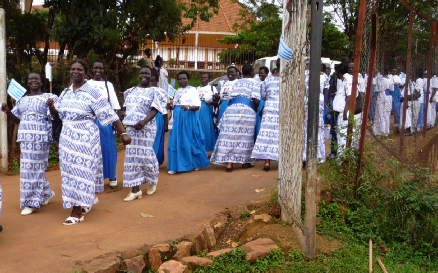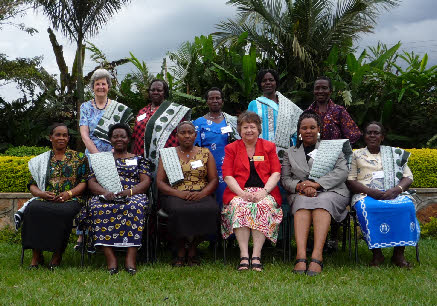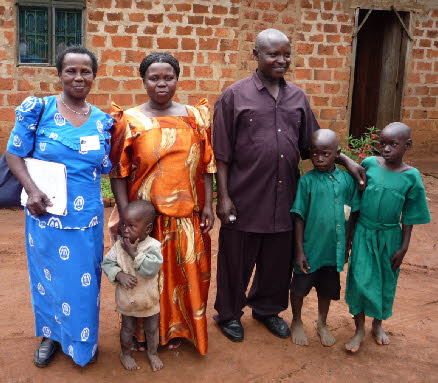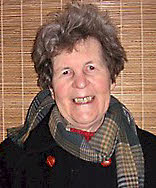
Scotland
©2009 Mothers' Union, Province of Scotland.![]() Reg Charity No. SC036459
Reg Charity No. SC036459![]() Terms of Use
Terms of Use![]() Privacy
Policy
Privacy
Policy
What we do
Uganda Blog



Mother’s
Union
Tartan
Find out more
Having returned from a very enlightening week in Uganda in October 2008, I thought I would jot down a few impressions I brought back with me.
Worship

The word to describe African worship is "exuberant". We had a real taste of this
when we attended the Ugandan special centenary service held in a field near the cathedral.
Some MU members, as they arrived, literally screamed with joy. The service itself
was a wonderful mixture of solemn Anglican liturgy and excited African dancing. With
a gospel band, they can make a four lined hymn last a good quarter of an hour -
At one stage we were brought in to join the dancing and did our best but there is no doubt that European bottoms don't wiggle nearly as well as African ones!
We learnt too that African time means little. The service programmed to last for an hour and a half actually lasted over three hours, but no one seemed to worry.
During the conference itself we found the African delegates who came from Tanzania and Uganda very practised at spontaneous worship and prayer. Every report would be prefaced by the words "Praise the lord" and every discussion or even session would be introduced with prayer. And at the slightest excuse they would burst into song, mostly hymns or choruses.
The Anglican Church
The church of Uganda is very authoritarian. A bishop's word is law and must not be challenged. The MU also has very strict rules. To belong you must be confirmed, you must be a mother and you must have been married in church (though some are challenging this last rule). In most branches you cannot attend a meeting unless you are in uniform.
The Conference

This was held in a retreat centre called the Rest Gardens. Our room consisted of a verandah, a small bedroom with just enough room for two mosquito netted beds, and a shower room. The water trickled erratically from the tap and we never managed to get any hot water. Also the tap swayed around like a flag in the wind but it was adequate and we coped. Public rooms were all open at the sides. The dining hall was large with a telly in one corner which we kept trying to switch off. Food was good and nourishing if a bit samey: fried chicken, beef stew, rice, potatoes, beans or cabbage, ground nut puree, (a pretty purple colour), cassava and a cooked and utterly tasteless type of banana. We also had lots of fruit, bananas, water melon and pineapple. The main conference hall was circular with a splendid ceiling and a stage.
It was the rainy season, and we had some rain every day often very heavy and noisy as it drummed on the roof. The rain meant it was often quite cool and we actually saw very little sun. A shame as the buildings were set in very pleasant gardens.
We had a mixture of plenary sessions and small discussion groups, named after animals. I was a lion. It was an excellent way to get to know a few of the delegates quite well. Some were well educated and quite sophisticated, others from rural areas struggled with English, and found discussion difficult. They were all very friendly.
We had one outing in a very rickety old bus well suited to negotiating the cliffs and craters which appear in the mud roads during the rainy season to see the Family Life Programme. It is truly amazing how they have turned lives around by motivating families especially the fathers to become self reliant and self sufficient through learning how to construct buildings, how to maintain a hygienic way of life, how to cook without being blinded by smoke, how to care for livestock and grow crops and so on. The families we saw were so proud and happy with their success. It was most impressive.

Indeed when the Africans spoke of their projects, we realised what a difference there is between them and us. We do what we can to alleviate suffering and bring help to families in trouble, but they seem often to be dealing with matters of life and death. It is sobering to hear how they care for Aids victims and their orphaned children, how they have programmes to teach the elementary rules of health and hygiene, or how to care for the environment, or to grow crops in the most sustainable way. Then there are the literacy and numeracy classes and training in all sorts of crafts or in secretarial or IT skills which can lead to setting up their own businesses and so I could go on.
So all in all it was a great experience.

Susan Crossfield,
Former Edinburgh Diocesan President
writes . . . .
